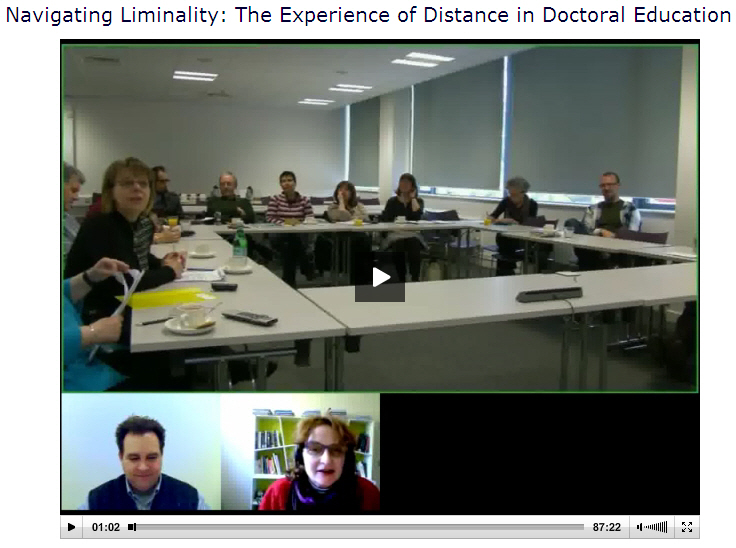Between now and then will find me finish making all the corrections and edits that have previously been identified, continue to refine my literature, and adjust internal issues of consistency and repetition. Phew!
Tag: liminality
Video of My Research Seminar
I am happy to share the video of my recent Research Seminar presentation, where I discussed my doctoral thesis research in progress.
If you ever want to get feedback and suggestions about your own research I cannot recommend this sort of opportunity highly enough. In many ways, this came at just the right time, as it forced me to try to make sense of all my work in a way that is understandable by a larger audience (outside of my supervisors and immediate colleagues). Wonderful opportunity, especially while writing up, to help clarify the thoughts as this was the first time I have publicly discussed my work from beginning to end.
Besides looking like Mr. Potato Head in the video (which I fully expected), I am happy with the results.
Doctoral Research in 100 Words
Working Title:
Navigating Liminality: The Experience of Distance in Doctoral Education
100 Word Abstract:
This research explores the experiences of doctoral students who study at a distance and whose postgraduate activities involve passing through liminal or troublesome periods in understanding concepts or processes. These thresholds commonly involve ontological or epistemological shifts, resulting in transformed ways of seeing one’s self and/or one’s research. The challenges posed through using technology in such doctoral supervision are often not acknowledged. Twenty-one interdisciplinary doctoral researchers from around the world were interviewed, with narrative inquiry as informed by grounded and actor-network approaches being used for the analysis. This research seeks to provide insights for tutors who engage in remote supervision.
Insights, encouragement, and gentle recommendations will be appreciated.
Doctoral Thesis Data Collection, Status #2: Emotions
While I am not beginning any systematic processing of this data yet (transcription, anyone? 😉 !!), there is one thing that I have learned in this process that I want to share for the benefit of anybody else planning a similar research endeavor. Data collection in the form of long, in-depth interviews takes a lot of energy. Moreover, I am finding that it takes almost everything out of me. Let me explain.
My research asks about barriers and liminal (in-between) periods that happen during doctoral study, resulting in some form of an aha! or new sense of one’s identity. This often involves the telling of difficult stories, ones that are personal and oftentimes riveting in nature. Being privelged with listening to these stories is a rich experience, one that requires my full attention in way unlike many of the other tasks I have encountered in research (or practice, for that matter). I feel emotionally humbled when I finish with each one, and find that I struggle to do my ordinary work or other commitments in life during this period.
I am thankful for this opportunity to engage in this study, as it is a deeply moving experience. I think I have a lot more to process in its effect in me, much less as part of my research.
Doctoral Thesis Data Collection, Status #1
 I want to share my progress with my doctoral thesis data collection that I started in my posting on July 28 where I outlined my research and began to request participants.
I want to share my progress with my doctoral thesis data collection that I started in my posting on July 28 where I outlined my research and began to request participants.
I have been absolutely blown away by the support and interest I have felt from so many people who have so kindly offered to assist or otherwise help promote participation in my work. Having already completed 7 interviews lasting between 60 and 90 minutes each, I feel I am indeed learning more about the liminal experiences that occur during doctoral studies related to learning leaps, aha! moments, and passing through conceptual thresholds.
I have learned that I really do not know what sorts of initial findings I can draw from this work until I begin transcribing and analyzing the transcripts, but I have already noticed that some of my questions and frames have developed the more I learn about how current and former doctoral researchers experience and make sense of their in-between periods of meaning-making while on the path to their degrees. Each person I speak with is so different from one another, and this opportunity to hear about what at times involves personal experiences en route to the degree often leaves me in awe.
I so value how generous many people are with their time, and I look forward to engaging with the other participants I have scheduled to interview through the end of the month (when I now hope to conclude my data collection for my research).
